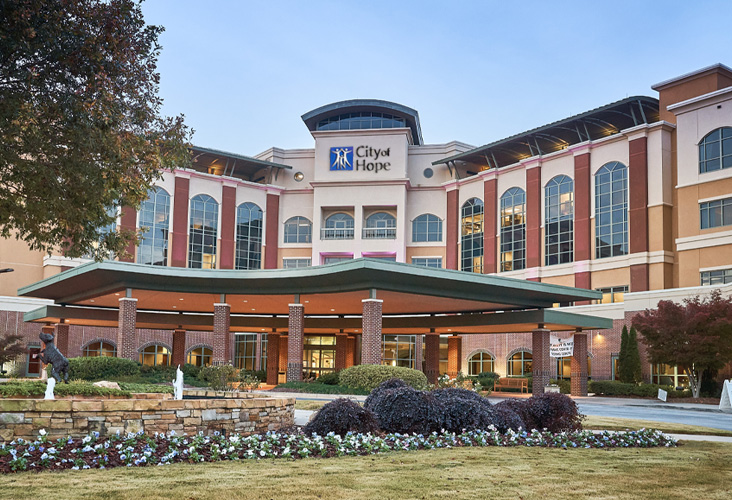

The clinicians in the Neuroendocrine Tumor Clinical Program at City of Hope® Cancer Center Atlanta have extensive experience diagnosing and treating neuroendocrine tumors (NETs), sometimes known as carcinoid tumors.
Our doctors work with referring physicians and their patients to help treat and manage this rare disease, which develops when abnormal growths begin to form in neuroendocrine cells. After staging NETs using diagnostics including Detectnet™, a diagnostic imaging agent that helps locate and identify NETs while exposing patients to less radiation than standard procedures, our cancer experts collaborate with one another, and with the patient, as part of a multidisciplinary team, to develop a personalized neuroendocrine tumor treatment plan tailored to each patient’s individual needs.
Our NET Clinical Program provides comprehensive, multidisciplinary care for patients with neuroendocrine tumors, bringing together clinicians from multiple disciplines, all focused on caring for patients with neuroendocrine tumors.
The neuroendocrine cancer team is led by Dhivya Prabhakar, MD, who brings extensive experience in hematology and medical oncology. Dr. Prabhakar collaborates with a multidisciplinary team of experts to evaluate and treat a variety of types and stages of cancer, with a focus on neuroendocrine tumors.
Explore the links below to learn more about the team.
An accurate diagnosis of your neuroendocrine tumor is important in determining your personalized treatment plan. To help arrive at an informed NET diagnosis as quickly as possible, the cancer experts at City of Hope Atlanta use Detectnet (copper Cu 64 dotatate injection) for patients receiving a positron emission tomography (PET) scan.
What is Detectnet?
Detectnet is a radioactive substance injected prior to a dotatate PET scan to help our doctors better locate and identify neuroendocrine tumors in diagnostic images. Detectnet is more stable than most radioactive imaging agents, which allows for better scheduling flexibility. It also allows our doctors to perform PET scans onsite, rather than having to refer patients to other imaging facilities. Another important benefit is that it’s designed to expose patients to less radiation than other agents.
How does Detectnet work?
Here’s what to expect from your PET scan using Detectnet:
Your PET scan results will be reviewed by a radiologist and other physicians. Your doctor will share the results with you and discuss options for treatment plans.
Are there side effects with Detecnet?
Patients have reported few side effects from Detectnet. In rare cases, patients have experienced nausea, vomiting or flushing. Talk to your doctor if you’re taking other medications, are pregnant, plan to become pregnant or are breastfeeding.
The NET Clinical Program provides patients a comprehensive array of treatment options. The type, location and extent of the disease dictate which treatments may be available.
Treatment options may include:
Because of the complexity and diversity of NETs, our experts collaborate daily, allowing them to recommend a personalized care plan.
Depending on each patient’s unique diagnosis and needs, members of the NET care team may include surgical, medical or radiation oncologists, gastroenterologists, interventional radiologists, endocrinologists, pathologists, pain management physicians, dietitians, naturopathic providers, behavioral health therapists and other trained clinicians.

New patients: (877) 401-9088
Existing patients: (770) 830-2822